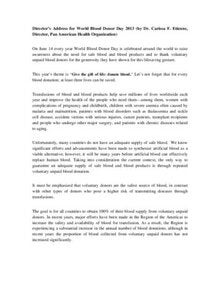Director’s Address for World Blood Donor Day 2013 (by Dr. Carissa F. Etienne, Director, Pan American Health Organization)

|
On June 14 every year World Blood Donor Day is celebrated around the world to raise awareness about the need for safe blood and blood products and to thank voluntary unpaid blood donors for the generosity they have shown for this lifesaving gesture. This year’s theme is “Give the gift of life: donate blood.” Let’s not forget that for every blood donation; at least three lives can be saved. Transfusions of blood and blood products help save millions of lives worldwide each year and improve the health of the people who need them—among them, women with complications of pregnancy and childbirth, children with severe anemia often caused by malaria and malnutrition, patients with blood disorders such as thalassemia and sickle cell disease, accident victims with serious injuries, cancer patients, transplant recipients and people who undergo other major surgery, and patients with chronic diseases related to aging. Unfortunately, many countries do not have an adequate supply of safe blood. We know significant efforts and advancements have been made to synthesize artificial blood as a viable alternative; however, it will be many years before artificial blood can effectively replace human blood. Taking into consideration the current context, the only way to guarantee an adequate supply of safe blood and blood products is through repeated voluntary unpaid blood donation. It must be emphasized that voluntary donors are the safest source of blood, in contrast with other types of donors who pose a higher risk of transmitting diseases through transfusions. The goal is for all countries to obtain 100% of their blood supply from voluntary unpaid donors. In recent years, major efforts have been made in the Region of the Americas to increase the safety and availability of blood for transfusion. As a result, the Region is experiencing a substantial increase in the annual number of blood donations, although in recent years the proportion of blood collected from voluntary unpaid donors has not increased significantly. According to country data from 2011, the proportion of voluntary unpaid blood donation in Latin America and the Caribbean averages 41.5%, specifically for Latin America is approximately 41% and 56% is for the Caribbean. Only 10 countries in Latin America and the Caribbean have achieved 100% voluntary unpaid blood donation. The 48th Directing Council of PAHO/WHO, held on October 2nd, 2008 adopted Resolution CD48.R7 (24), which urges the Member States to “terminate replacement and paid blood donation by the end of 2010” and “terminate mandatory patient replacement of transfused blood by the end of 2010.” Unfortunately, we have reached the middle of 2013 and have not been successful in accomplishing either of these goals. Replenishment donation prevails in the majority of countries in the Region, and some countries continue to pay donors. If we are to reach the goal of 100% voluntary unpaid blood donation in the immediate future, we must intensify efforts to improve the education, promotion, capture and selection of donors to ensure an adequate supply of safe blood. This year, we will be celebrating the 10th anniversary of World Blood Donor Day. We invite countries to share with us the testimonies of people whose lives have been saved thanks to the generosity of these unpaid voluntary donors. We believe that these testimonies will motivate regular donors to continue donating and speak to responsible healthy people who have not yet donated especially young people. We repeat that the main objectives of this day are:
The global host country for this year’s celebration of voluntary blood donors will be France; in the Region of the Americas, it will be Jamaica, where I will be on 14 June to take part in the ceremony to express our gratitude to these champions of unpaid voluntary donation. In Jamaica we will be accompanied by schoolchildren of the island to encourage them to follow the example demonstrated by current donors and make them 3 aware of the importance of voluntary donation. These youngsters represent our future voluntary blood donors. Never forget that blood is the most valuable gift you can offer other people, because “Every blood donation is a gift of life” |
